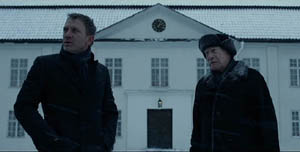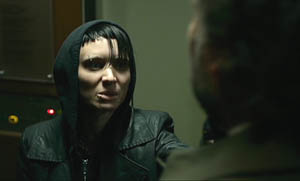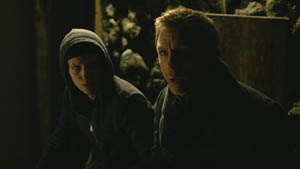|
Somewhere in the middle of viewing the original Swedish version of this film, it occurred to me that if an American remake was in the offing, they should get Daniel Craig to play Blomkvist. So there it is: my one bit of dazzling Hollywood prognostication. 
I was hesitant about seeing this. While the original is well-regarded and loved by many, it left me feeling like I needed to take a shower. The film reveled in depicting humans at the absolute basest level of depravity, and knowing that David Fincher was tapped to direct the US version did little to assuage my concerns; while unquestionably a smart and innovative director (counting on his resume one of my favorite films, Fight Club), he's not a man known for soft-pedaling anything. So is his version of the popular novel better, worse, or, as many would have it, unnecessary? Owing to its origins as the first in a series of three books, The Girl with the Dragon Tattoo has a bizarre structure that no original screenplay would be likely to emulate, with an A, B, and C story somewhat awkwardly wrestling for attention. The film starts with, of all things, the C story, which disappears rather quickly and only properly resurfaces in an extended coda that ties things up long after most of the audience has probably ceased to care about the events in question. The B story runs its course by the halfway point and becomes more or less irrelevant afterwards. The main thrust is the story of journalist Mikael Blomkvist's attempts, following a calamitous and highly public lawsuit against his magazine, to solve the stone-cold case of a young girl, missing and presumed dead forty years ago, in return for promised leverage against the corporate mogul responsible for setting him up for public disgrace. The facts of the case amount to a parlor drama of sorts: the girl was last seen on the family estate, which sits on an island accessible by a lone bridge. Whoever killed her must, by virtue of when it happened, have been one of her own family. 
While the film has its origin in a standard prose novel, one might easily mistake it for the stuff of a modern comic book. The characters are all drawn in broad, obvious strokes. There's the white knight hero, determined to see justice done and to clear his name, there's a panopoly of villains with rotten hearts and no apparent reason to be pure evil, and the dark avenger, like a female version of The Crow, or a slightly more screwed-up Batman, all transplanted into an uncustomarily sadistic Miss Marple mystery. There's ex-Nazis, Biblically-based riddles, and old photographs used to bring long-gone events to life again; there's an appalling degree of sexual violence and a serial killer whose identity could likely be pegged by a reasonably bright hamster (while I did already know the identity of the guilty party before going into this remake, it doesn't appear as though the new presentation has done any better a job at misdirection than did the Swedish version). The cinematography is gorgeous, though often in the service of showing us things we might be happier not seeing. I couldn't help but feel as though Fincher was playing dirty pool with me when he presaged the most disturbing scene of abuse visited upon the titular girl with a rapidly retreating camera shot, implying, a la Hitchcock's Frenzy, that we would be spared the details of the event, only to then cut back inside and force us to view the entire repugnant scene after all. I realize the director's name isn't David Flincher, but it wouldn't kill him to try it now and again. 
So what, then, of our heroine? I'm not going to waste keystrokes contrasting Rooney Mara's performance with Noomi Rapace's in the original. Based on my single viewing of each version, I had no sense that I was seeing anything different in the character. Does she work? Yes, I must admit, but with caveats. The popular view of Lisbeth Salander as some sort of arch-feminist statement is borderline hilarious to me; I cannot possibly view her as anything other than a blatant male fantasy. She's small, but ferocious, she's cunning, indomitable, hyper-competent and skilled, sexually promiscuous, and of course bisexual, a cocktail of totally smokin' character traits that author Stieg Larsson only gets away with by also making her physically off-putting. Had he just taken the last step and made her a hot little waif, it would've been hysterically blatant. Maybe her ability to shrug off traumatic events without appearing traumatized is inspiring to young women, but the voyeuristic attitude the film displays in insisting on detailing them so graphically in the first place makes it feel more like exploitation to me. I can only assume Larsson knew he would be writing more stories with these characters when he penned the first book, since the B story of Lisbeth and her abusive guardian has zilch to do with the main plot, beyond a very lengthy establishment of motive. Is Fincher's take on the material better? In some ways yes-if nothing else, it's marginally less disturbing in some areas, and his directorial eye is one I quite appreciate. But to those suggesting that this film only exists because Americans don't like to read subtitles (and I'm fully sympathetic to issues of domestic illiteracy), I'd like to suggest the following, less cynical reasons as alternatives. One, just because you like subtitled films doesn't mean your local multiplex (if you live in a town big enough to have one of those in the first place) will feel it profitable to free up one of its theaters that could be showing a new superhero flick just because art-house types would appreciate it. Two, subtitles regrettably tend to oversimplify dialogue for the benefit of slow readers, meaning the script loses nuance. And third, it's easier to judge, and therefore potentially appreciate, a performance given in a language you actually understand. While I can follow facial acting and overall emotion, for all I could possibly know, given that I speak not a lick of Swedish, the original cast could've given the worst line readings in the history of the language and I'd never be able to tell. I find it hard to wholeheartedly recommend either version, really; for every thing they do right, there's a counterbalancing strike against. As I see it, I can find the aspects I enjoyed in other films with far less creep factor, such as De Palma's Blow Out (and yes, there is something oddly karmic about stealing from De Palma) or Roman Polanski's The Ghost Writer. Of course, the irony there is that Fincher, for all of his cringe-inducing screen material, isn't an actual rapist. Nothing's ever easy. -review by Matt Murray
|
|
||||||||